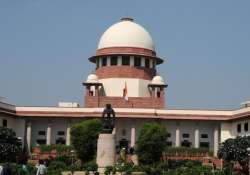No lenience warranted in corruption cases: SC
New Delhi: At a time when corruption has affected the system like cancer, courts should not get swayed by the concept of mercy while awarding punishment to the corrupt, the Supreme Court has said.The apex

New Delhi: At a time when corruption has affected the system like cancer, courts should not get swayed by the concept of mercy while awarding punishment to the corrupt, the Supreme Court has said.
The apex court's observation came while terminating the services of a conductor employed in Uttar Pradesh State Transport Corporation for carrying 25 passengers without ticket in 1992.
"In the case at hand, as we perceive, the delinquent employee has harboured the notion that when the cancerous growth has affected the system, he can further allow it to grow by covering it like an octopus, with its tentacles disallowing any kind of surgical operation or treatment so that the lesion continues.
"The whole act is reprehensible and such a situation does not even remotely commend any lenience," a bench of justices Dipak Misra and Prafulla C Pant said.
It said that both the labour court and Allahabad High Court committed error by imposing lesser punishment and granting chance of reformation to Gopal Shukla as the only punishment should have been dismissal.
The apex court said that the high court appeared to have been swayed by concept of forgiveness and mercy while remaining oblivious to the great harm caused to transport corporation.
"When such kind of indiscipline causes financial loss to the Corporation, adequate punishment has to be imposed and in our view such misconduct does not stand on a lesser footing than embezzlement or corruption and more importantly results in loss of faith and breaches the trust," it said.
According to the bench, a number of persons were allowed to travel in the bus without tickets and if fares were paid, these were pocketed.
"We must not forget the fundamental duty and work," the bench said, adding that the approach of the high court and labour court showing leniency towards the conductor is not judicially maintainable.